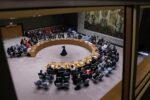U.S. Secretary of State Antony Blinken embarked on a visit to Jordan and Turkey on Wednesday as part of efforts to unify the region around a shared vision for Syria’s future, following the overthrow of authoritarian leader Bashar al-Assad.
Blinken is scheduled to visit Akaba in Jordan and Ankara in Turkey, where he will meet with key Arab and Muslim leaders to discuss developments in Syria, Israel, Gaza, Lebanon, and broader regional issues, according to the U.S. State Department.
A spokesperson stated that Blinken aims to secure consensus among regional leaders on key principles for Syria’s transition after Assad. These include full respect for minority rights, facilitating humanitarian aid, ensuring Syria does not become a safe haven for terrorism, and securing and safely dismantling Syria’s chemical and biological weapons stockpiles. Blinken emphasized that the U.S. will recognize a Syrian government that upholds these principles.
Speaking before the House Foreign Affairs Committee on Wednesday, Blinken expressed confidence that a future administration under President-elect Donald Trump would maintain the U.S. commitment to eliminating the so-called “caliphate” established by the Islamic State (ISIS) in Syria. Trump and his team have previously stated that the U.S. should not be heavily involved in Syria.
“This is not our war. Let’s see what happens,” Trump stated on his Truth Social platform on December 7.
During the four-hour hearing, Blinken warned that Syria’s fragmentation could lead to massive migrations, further areas becoming hubs of terrorism and extremism—scenarios that are not in U.S. interests.
In Akaba, Blinken will meet with Jordanian King Abdullah II and senior officials to discuss bilateral issues, reaffirm the U.S.-Jordan strategic partnership, and reinforce American support for regional stability.
In Ankara, Blinken is expected to engage with senior Turkish officials to strengthen U.S.-Turkey cooperation on shared priorities, including counterterrorism and regional stability.
Some analysts argue that there is a strategic reason to maintain the current U.S. presence of around 900 troops in Syria to monitor ISIS and prevent the resurgence of terrorist groups in the region. However, greater involvement is considered contrary to U.S. interests. Thomas Graham, a former U.S. diplomat and current member of the Council on Foreign Relations, told VOA that the U.S. has not been significantly involved in Syria since the start of the civil war over a decade ago.
On Tuesday, Blinken held discussions with counterparts from Jordan, the United Arab Emirates, Qatar, and Egypt, reiterating the need for a Syrian-led transition.
Syrian rebel leader Abu Mohammed al-Golani stated on Wednesday that his forces would dismantle the security apparatus of the ousted Assad regime and was working with international organizations to identify and secure locations for chemical weapons storage.
The U.S. responded cautiously to Golani’s comments. Pentagon spokesperson Sabrina Singh told reporters, “We welcome this kind of stance, but … actions must match words.”
Meanwhile, U.S. President Joe Biden is scheduled to attend a virtual G7 meeting on Friday to discuss Syria and other pressing Middle East issues.
Last Sunday, Syrian rebel groups toppled the Assad regime in a surprise offensive that lasted less than two weeks, ending decades of brutal repression. While many Syrians celebrate Assad’s departure, uncertainty remains about the country’s future.
The dominant opposition group, Hayat Tahrir al-Sham, is rapidly consolidating power. Meanwhile, foreign actors are competing for influence over the newly-formed government or attempting to limit its potential as a security threat.
Gerald Feierstein, director of the Arab Gulf States Institute, told VOA, “The Turks view political Islam more positively and have long-standing ties with Hayat Tahrir al-Sham and Golani—not close ties, but ties nonetheless. The Gulf states will be more concerned about which direction Damascus takes.”
Feierstein noted that while there is currently no “huge gap” between Turkey and the Gulf states on this issue, that divide could widen over time if Syria’s new government adopts a more hardline Islamic stance than expected.
Syria’s nearly 14-year civil war has claimed 500,000 lives and displaced half of its pre-war population of 23 million. Millions of Syrians have fled to neighboring countries such as Jordan, Turkey, Iraq, and Lebanon, with many continuing their journey to Europe in search of safety.







